Testing and Assessment in education.pptx
- 1. DESIGNED BY MINA EL GOUR Definition of terms: Assessment, testing, Evaluation, measurement, Exam, Quiz and teaching CRMEF - SOUSS MASSA MODULE: TESTING and ASSESSEMENT TRAINER: PROF. AYAD CHRAA Training year 2024-2025
- 3. Teaching The act of delivering content, facilitating learning, and guiding students using specific methods, materials, and strategies.
- 4. ASSESSMENT A broad and continuous process of collecting and interpreting information about learners’ progress and performance. It involves collecting data through various tools such as tests, quizzes, assignments, or observations.
- 5. MAIN TYPES OF ASSESSMENT Ongoing, during the learning process. FORMATIVE at the end of a unit or term SUMMATIVE
- 6. Measurement is specifically about assigning numerical values or scores to a student's performance, based on certain criteria. It’s a way of quantifying what a student knows or can do. MEASUREMENT
- 7. Evaluation refers to the process of making judgments or decisions based on the information collected through assessments or other forms of data gathering. It’s the final step in understanding the effectiveness, value, or success of something, whether a student’s performance, a lesson plan, or a whole program. EVALUATION
- 8. Assessment Gather information about learning → ↓ Measurement Convert that information into scores/numbers → ↓ Evaluation Use the scores to make a decision or judgment →
- 9. Testing Testing is a specific method or tool within the assessment process that typically involves measuring a student’s knowledge or skills using a standardized or structured format.
- 10. Quiz A quiz is a shorter, less formal assessment tool used to check a student’s understanding of a small portion of the material.
- 11. Exam An exam is a formal, high-stakes assessment, often comprehensive, used to assess a large portion of material or the entire course. It’s typically used for summative assessment.
- 12. • Richardson, V. (2001). Handbook of Research on Teaching. American Educational Research Association. • Brown, H. D. (2004). Language assessment: Principles and classroom practices. Perason Education. • Nitko, A. J. (1996). Educational assessment of students. Prentice-Hall Order Processing Center, PO Box 11071, Des Moines, IA 50336-1071. References
- 13. Time to test your knowledge! Quiz Time
- 14. assessment is only used to assign grades. True False
- 15. all tests are considered assessments, but not all assessments are tests. True False
- 16. evaluation involves making judgments about the quality of student work. True False
- 17. A test is best described as... A process for judging teaching effectiveness A A general term for all forms of evaluation D) A method of peer review B C D A one-time tool to measure knowledge or skills
- 18. Measurement in education mainly involves... Giving opinions on student work A C) Encouraging student reflection Writing a report B C D Assigning a numeric value or score
- 19. which of the following is typically short, informal, and used during a lesson? Test A Evaluation B C D Exam Quiz
- 20. what do assessment and evaluation have in common? Both assign grades A Both are formal exams B C D Both include judgment Both involve collecting information
- 21. YOU THANK




















